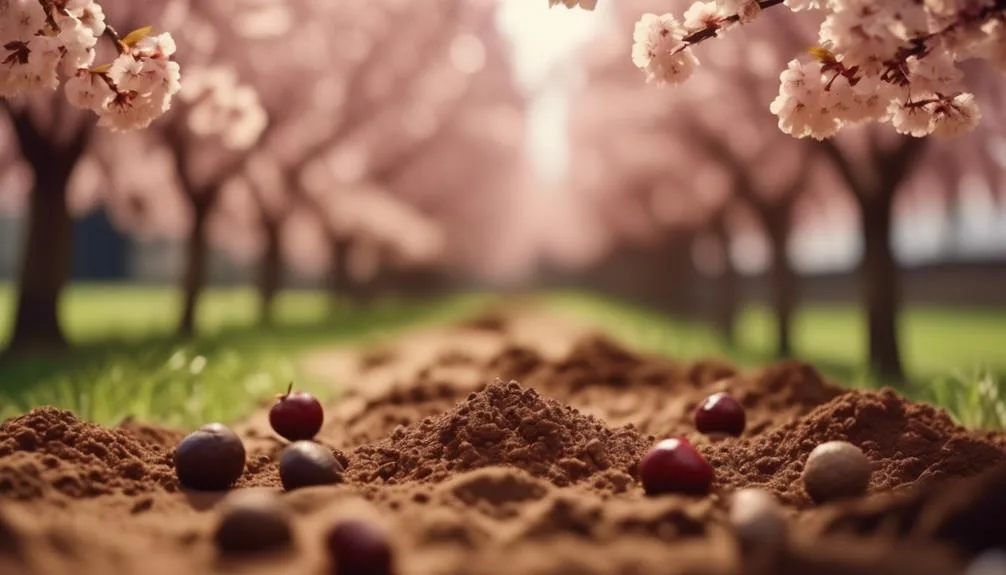Choosing the right soil for planting cherry trees is essential for their health and growth. With various soil types available, it's important to understand how each one can affect your cherry trees.
Let's take a look at the different soil characteristics to help you make the best choice for your cherry trees' success.
Sandy Loam Soil
Sandy loam soil is a perfect match for cherry trees due to its ideal soil composition and planting depth. The sandy loam texture allows for excellent drainage, preventing waterlogging that can harm cherry tree roots. Its balanced composition of sand, silt, and clay provides a stable structure for root development and nutrient retention.
When planting cherry trees, the optimal planting depth in sandy loam soil is around 2-4 inches. This depth allows the tree's roots to establish themselves firmly while still accessing essential moisture and nutrients. Sandy loam soil's loose structure also promotes easy root penetration and growth, ultimately supporting healthy and thriving cherry trees.
Well-Drained Clay Soil
While sandy loam soil provides excellent drainage for cherry trees, well-drained clay soil offers its own unique benefits for fostering healthy root development and nutrient retention.
When dealing with clay soil, it's essential to improve its drainage capabilities. Adding organic matter like compost or well-rotted manure can significantly enhance the soil structure, allowing better water percolation and root penetration. By breaking up the compacted particles, the soil becomes more porous, improving air and water movement. This helps prevent waterlogging and creates a healthier environment for cherry tree roots to thrive.
Additionally, the water retention properties of clay soil are advantageous during dry periods, ensuring a steady supply of moisture to the trees. When managed correctly, well-drained clay soil can provide a stable and nurturing foundation for cherry tree growth.
Ph-Neutral Soil
Improving the pH balance of your soil to achieve neutrality is crucial for creating an optimal growing environment for cherry trees. Start by conducting a soil test to determine the current pH level. Cherry trees thrive in slightly acidic to neutral soil with a pH range of 6.0 to 7.0.
If your soil is too acidic or alkaline, consider incorporating organic matter, such as compost, to help balance the pH. Nutrient management is essential to maintain a neutral pH. You can use organic fertilizers that won't drastically alter the soil's pH.
Additionally, incorporating mulch can help regulate the soil pH by preventing rapid fluctuations. By monitoring and managing the pH level of your soil, you can create a favorable environment for your cherry trees to flourish.
Fertile, Organic Soil
To create fertile, organic soil for your cherry trees, focus on incorporating nutrient-rich compost and organic matter to improve the overall soil quality and provide essential nutrients for healthy tree growth.
Nutrient-rich compost not only enhances the fertility of the soil but also supports microbial activity, creating a thriving ecosystem underground. This fosters a harmonious environment for cherry tree roots to flourish and absorb the necessary nutrients for robust growth.
Additionally, organic matter aids in moisture retention, ensuring that your cherry trees have access to consistent hydration.
Moist, Aerated Soil
Enhance the moisture and aeration of the soil for your cherry trees by incorporating organic materials and employing proper irrigation techniques. Cherry trees thrive in well-draining soil with good water retention capabilities. To achieve this, consider the soil composition and water retention by incorporating the following organic materials:
| Organic Material | Soil Composition | Water Retention |
|---|---|---|
| Compost | Improves soil structure and water retention | Increases water retention capacity |
| Peat Moss | Enhances soil aeration | Retains moisture |
| Mulch | Adds organic matter | Helps retain soil moisture |
Conclusion
In your gardening endeavors, remember that sandy loam, well-drained clay, pH-neutral, fertile organic, and moist, aerated soil are key for thriving cherry trees.
By testing and amending your soil as needed, you set the stage for healthy growth.
Here's to a successful cherry tree planting journey!

My interest in trees started when I first saw the giant sequoias in Yosemite.
I was a teenager then, and I remember thinking, “I need to learn more about this.”
That moment stuck with me.
A few years later, I went on to study forestry at Michigan Tech.
Since graduating, I’ve worked in a mix of hands-on tree care and community education.
I’ve spent over ten years helping people understand how to plant, maintain, and protect the trees in their neighborhoods.
I don’t see trees as just part of the landscape.
They are living things that make a real difference in our daily lives.
